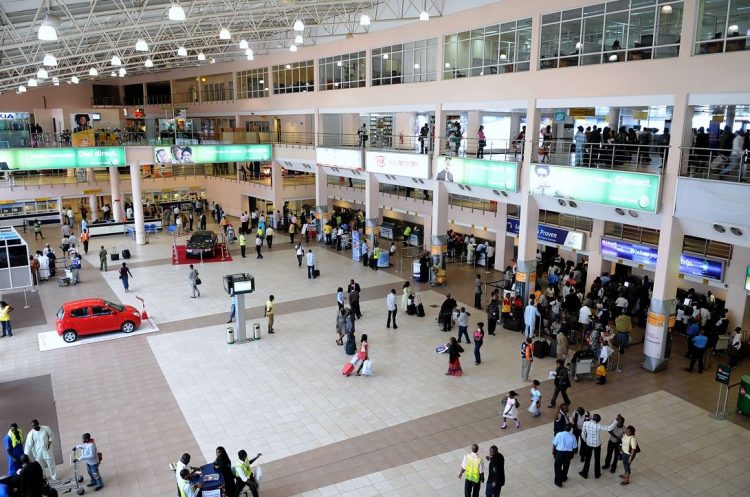
Air travellers to the United States will face tougher COVID-19 testing rules as other countries tightened border controls on Wednesday to try to slow the spread of the Omicron variant that Nigeria said had been circulating weeks earlier than thought.
Reuters reports that retrospective tests on confirmed COVID-19 infections in travellers to Nigeria had identified the Omnicron variant among a sample collected in October, the Nigeria Centre for Disease Control said, without naming the country of origin.
South Africa first reported the variant a week ago and many countries have responded by curbing travel from there and other places deemed most exposed amid uncertainty about how easily the variant can spread and whether it can evade vaccine protection.
Data from other countries already shows the variant was circulating before it was officially identified in South Africa and cases have appeared around the world, with numbers expected to grow. read more Australia said at least two people visited several locations in Sydney while likely infectious and Denmark said an infected person had taken part in a large concert.
Japan, which had already barred all new foreign entrants, reported its second case of the new variant and said it would expand travel curbs.
Hong Kong added Japan, Portugal and Sweden to its travel restrictions while Uzbekistan said it would suspend flights with Hong Kong as well as South Africa. Malaysia temporarily bared travellers from eight African countries and said Britain and the Netherlands could join the list.
The World Health Organization (WHO) said “blanket travel bans will not prevent the international spread and they place a heavy burden on lives and livelihoods”, while advising those unwell, at-risk or 60 years and over and unvaccinated to postpone travel.
Global shares came off lows plumbed on Tuesday after remarks by the CEO of Moderna (MRNA.O) raised questions about the efficacy of COVID-19 vaccines against Omicron.
Health officials have since offered reassurances and reiterated calls for people to get vaccinated, saying it is very likely vaccines will still prevent people from getting seriously ill.
“This isn’t a call to arms, but a call to get jabs in arms. And quickly,” British Prime Minister Boris Johnson tweeted as his health minister, Sajid Javid, reported 22 confirmed cases of the Omicron variant, a number he said, “will certainly go up”.
European Medicines Agency Executive Director Emer Cooke said laboratory analyses should indicate over the next couple of weeks whether the blood of vaccinated people has sufficient antibodies to neutralise the new variant.
BioNTech’s CEO said the vaccine it makes in a partnership with Pfizer (PFE.N) would likely offer strong protection against severe disease from Omicron. The European Union brought forward the start of its vaccine rollout for five-to-11-year-old children by a week to Dec 13.
Britain and the United States have both expanded their booster programmes in response to the new variant, which has highlighted the disparity between massive vaccination pushes in rich nations and sparse inoculation in the developing world.
Some 56 countries were reportedly implementing travel measures to guard against Omicron as of Nov. 28, the WHO said.
WHO head Tedros Adhanom Ghebreyesus said he was concerned that several member states were “introducing blunt, blanket measures”, which “will only worsen inequities”.
“The World Health Organization classified Omicron as a “variant of concern,” due to the number of mutations that might help it spread or evade antibodies from prior infection or vaccination.
GLOBAL SPREAD
Nigeria and Norway were among the latest countries to report cases of the variant while Saudi Arabia confirmed its first case coming from a north African country. read more
Germany, which is battling a surge in COVID-19 infections and deaths, reported that four fully vaccinated people had tested positive for Omicron in the south of the country but had moderate symptoms.
The United States is moving to require that all air travellers entering the country show a negative COVID-19 test performed within one day of departure, the Centers for Disease Control and Prevention (CDC) said late on Tuesday.
Currently, vaccinated international travellers can present a negative result obtained within three days from their point of departure. The new one-day testing requirement would apply to U.S. citizens as well as foreign nationals.
The CDC lists about 80 foreign destinations as having “Level Four”, its highest level of COVID-19 transmission, and discourages Americans from travelling to those destinations.
In Asia, Japan said it would expand its entry ban to foreigners with resident status from 10 African countries.
South Korean Interior and Safety Minister Jeon Hae-cheol called for tighter virus prevention measures to head off Omicron, after suspected cases entered from Nigeria. The country has not detected any confirmed cases of Omicron so far.
Global airlines are preparing for fresh volatility, analysts said. Japanese airlines ANA and JAL said they were suspending new reservations for international flights to the country until the end of December. read more
“It feels a little bit like we are back to where we were a year ago and that’s not a great prospect for the industry and beyond,” Deidre Fulton, a partner at consultancy MIDAS Aviation, said at an industry webinar.
Reporting by David Shepardson in Washington, Sakura Murakami and Elaine Lies in Tokyo, Reju Jose and Jamie Freed in Sydney, and Reuters bureaus; Writing by Himani Sarkar and Philippa Fletcher; Editing by Shri Navratnam, William M




纸飞机中文版 群组功能强大,可容纳大量成员,适合社群交流和信息分享。
telegram为您详解这款流行通讯工具的各项特性。从加密聊天到频道广播,应有尽有。